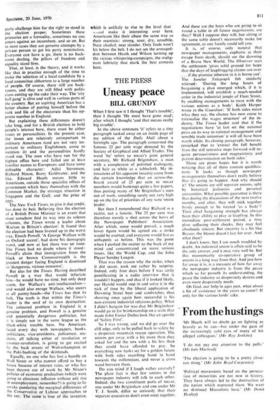THE PRESS
Uneasy peace
BILL GRUNDY
When I first saw it I thought 'That's trouble', then I thought 'He must have gone mad', after which I thought 'and that means really big trouble'.
In the above sentences 'it' refers to a tiny paragraph tucked away on an inside page of my edition of the Daily Mail about a fortnight ago. The paragraph concerned the famous 25 per cent wage demand by the Society of Graphical and Allied Trades. The word 'he' refers to socaT's joint general secretary, Mr Richard Briginshaw, a man with a complexion of polished mahogany, and hair as white as a tablecloth. My in- timations of his apparent insanity came from the certain knowledge that an across-the- board award of 25 per cent to SOGAT members would bankrupt quite a few papers, thus putting many of Mr Briginshaw's men out of work, something surely not very high up on the list of priorities of any sane union leader.
But then I remembered that Richard is a realist, not a lunatic. The 25 per cent was therefore merely a shot across the bows of the Newspaper Publishers' Association. After which, sense would prevail, a much lower figure would be agreed on, a strike would be averted, and everyone would live as unhappily as before. This was the point when I pushed the matter to the back of my mind and concentrated on more serious issues, like the World Cup, and the John Player Sunday League.
That was the reason why the strike, when it did occur, took me rather by surprise. Indeed, only four days before I was airily pontificating in a radio interview that it wouldn't happen, and that if it looked likely, our Harold would step in and solve it in the nick of time by the liberal application of Downing Street beer and sandwiches, thus showing once again how successful is his non-existent industrial relations policy. What I didn't bargain for was that Mr Briginshaw would go in for brinkmanship on a scale that made John Foster Dulles look like an apostle of 'Safety First'.
So I was wrong, and we did go over the cliff edge, only to be pulled back to safety by a desperate mountain rescue operation. The unions got away with a bit more than they
asked for the NPA with a bit less than they could have afforded to pay. So everything now looks set for a golden future with both sides marching hand in hand towards the millennium, and never a cross word between them.
Do you mind if I laugh rather coarsely? The plain fact is that few unions in the newspaper industry will talk to each other. Indeed, the two constituent parts of SOGAT, one under Mr Briginshaw and one under Mr T. J. Smith, differ so seriously that their separate executives don't even meet together. And these are the boys who are going to sit round a table in all future negotiations, are they? Well I suppose they will, but sitting at the same table doesn't necessarily make for agreement, as any family could tell you.
It is, of course, only natural that newspaper managements, euphoric at their
escape from death, should see the dawning of a Brave New World. The Observer says the settlement 'gives solid ground for hope that the days of leapfrogging claims are over ... if the promise inherent in it is borne out'.
The Sunday Telegraph felt similarly relieved : 'During the long hours of bargaining a plan emerged which, if it is implemented, will establish a much-needed order in the industrial jungle of Fleet Street, by enabling managements to treat with the various unions as a body'. Keith Harper wrote in the Guardian: 'If both sides mean what they say, the chance has now come to rationalise the wages structure' of the in- dustry. The Times leader said that if the negotiations have 'at last set the national press on its way to rational management and sensible trade unionism' it will all have been worth while. Its closing paragraph, however, remarked that to 'extract the full benefit from the still tentative steps forward will re- quire persuasiveness and magnanimity and patient determination on both sides.'
ThOse are pious hopes but it is worth noticing that all of them contain qualifica- tions. It looks as though newspaper managements themselves don't really believe that it's going to happen. And why should it? The unions are still separate unions, split by historical jealousies and personal animosities. What possible guarantee is there that during the discussions of the next twelve months, and after, they will stick together firmly enough to be treated 'as a body'? Their chief bargaining strength—has always been their ability to play at leapfrog. In this immediate post-settlement period, a rosy glow suffusing their cheeks, they may feel absolutely sincere. But sincerity is a bit like Brasso: the bloom doesn't last for ever. And what then?
I don't know, but I am much troubled by doubt. An industrial union is often said to be the only answer, and it may very well be. But this momentarily co-operative group of unions is a long way from that. And just how far away it is, is a measure of how far away the newspaper industry is from the peace which so far passeth its understanding, the peace the industry so desperately desires and even more desperately needs.
Oh God, our help in ages past. what about a bit of assistance in the years to come? If only for the various lords' sake.


































 Previous page
Previous page